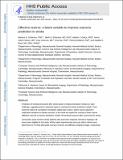Effective Reserve: A Latent Variable to Improve Outcome Prediction in Stroke
Author(s)
Schirmer, Markus D.; Dalca, Adrian Vasile; Golland, Polina
DownloadAccepted version (703.8Kb)
Terms of use
Metadata
Show full item recordAbstract
Prediction of functional outcome after stroke based on initial presentation remains an open challenge, suggesting that an important aspect is missing from these prediction models. There exists the notion of a protective mechanism called brain reserve, which may be utilized to understand variations in disease outcome. In this work, we expand the concept of brain reserve (effective reserve) to improve prediction models of functional outcome after acute ischemic stroke (AIS). Consecutive AIS patients with acute brain magnetic resonance imaging (<48 hours) were eligible for this study. White matter hyperintensity and acute infarct volume were determined on T2 fluid attenuated inversion recovery and diffusion weighted images, respectively. Modified Rankin Scale scores were obtained at 90days poststroke. Effective reserve was defined as a latent variable using structural equation modeling by including age, systolic blood pressure, and intracranial volume measurements. Of 453 AIS patients (mean age 66.6 ± 14.7 years), 36% were male and 311 hypertensive. There was inverse association between effective reserve and 90-day modified Rankin Scale scores (path coefficient -0.18 ± 0.01, P < .01). Compared to a model without effective reserve, correlation between predicted and observed modified Rankin Scale scores improved in the effective-reserve-based model (Spearman's ρ 0.29 ± 0.18 versus 0.15 ± 0.17, P < .001). Furthermore, hypertensive patients exhibited lower effective reserve (P < 10-6). Using effective reserve in prediction models of stroke outcome is feasible and leads to better model performance. Furthermore, higher effective reserve is associated with more favorable functional poststoke outcome and might correspond to an overall better vascular health.
Date issued
2019-01Department
Massachusetts Institute of Technology. Computer Science and Artificial Intelligence Laboratory; Massachusetts Institute of Technology. Department of Electrical Engineering and Computer ScienceJournal
Journal of stroke and cerebrovascular diseases
Publisher
Elsevier BV
Citation
Schirmer, Markus D. et al. “Effective Reserve: A Latent Variable to Improve Outcome Prediction in Stroke.” Journal of stroke and cerebrovascular diseases 28 (2019): 63-69 © 2019 The Author(s)
Version: Author's final manuscript
ISSN
1052-3057